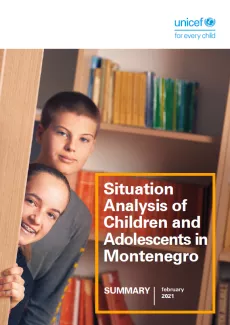Situation Analysis of Children and Adolescents in Montenegro
Summary

- Available in:
- Crnogorski
- English
Highlights
In Montenegro, as in other countries across the globe, the COVID-19 pandemic is putting at risk the progress made in ensuring child and adolescent rights over the last decades. While children and adolescents represent about 10 per cent of those directly affected by the pandemic, the indirect effects of the pandemic on children are clearly reflected in an increase in household poverty due to the loss of income and jobs, as well as a fall in remittances.
Children had an above-average risk of poverty before the pandemic – almost 34 per cent were at risk of poverty in 2019 compared to 24.5 per cent at risk among the general population – and it is expected that children will experience higher rates of deprivation as a result of the current economic and social challenges. Despite the government’s commitment to ensuring the continuity of the teaching process, the disruptions to learning that have unavoidably occurred are likely to have affected those children who were already at a disadvantage. About 16 per cent of children up to the age of 18 do not have access to a computer or laptop connected to the internet. These children were already on the wrong side of the digital divide and, with increased use of distance learning methods, their disadvantage is being compounded. Furthermore, reduced contact and lack of socialization with peer groups during the pandemic is also having short- and potentially long-term effects on children. Essential and routine health services for children are at risk of being interrupted, including, importantly, preventive measures such as vaccination programmes.
Global evidence shows that physical distancing rules and confinement to homes over long periods, coupled with the fear and stress associated with economic pressures, increase the risk of domestic violence. In the first months of the pandemic, Centres for Social Work (CSWs) and non-governmental organizations (NGOs) in Montenegro reported an increase in cases of child victims or witnesses of domestic violence. There was, in particular, an increase in psychological violence, that is, children witnessing arguments between parents or who were themselves involved in violent arguments, notably between parents and adolescents.





